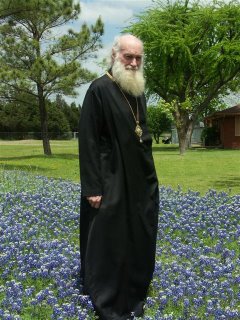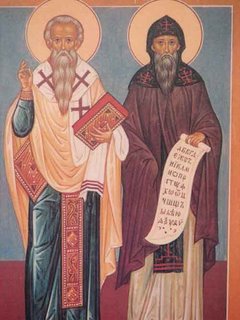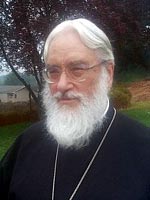
One of the greatest joys in my journey to Orthodoxy was meeting Archbishop Dmitri of Dallas and the South. Our mission in Baton Rouge, Saint Matthew the Apostle, is privileged to be under his oversight.
Several years ago, a brief account of his life and ministry was published by Frederica Mathewes-Green in
Christianity Today. The essay is posted with her permission.
Tex-Mex Orthodoxyby
Frederica Mathewes-Green[Christianity Today - May 21, 2002}
It’s not a ten-gallon hat; the soft, tall cap of black cloth could have been tailored over a one-gallon milk jug. Fronted by a gold metal cross, the hat tops a Dallas clergy leader who looks more like mountain man than a televangelist. At age 78, Archbishop Dmitri Royster’ s face is deeply lined and a full white beard spills over his black cassock. He has done the work of the Lord all over the country, and now he’ s back where he started, in the great state of Texas.
When the archbishop was just a teenager in a small town near Dallas he was called Robert Royster. He and his older sister were "strong bible-believing Baptists, and very involved in our church," he tells Christianity Today. "But whenever they taught about the bible, we felt they were leaving half of it out."
Many an adolescent raised Baptist in Texas would tend toward the opposite conclusion — that he was being force-fed more bible than anyone could ask or imagine. But for the Royster kids there were mysterious gaps. "They just didn’t do a complete bible," Abp. Dmitri says. "The Eucharist, for example — we wondered why the Gospels called it the Body and Blood of Christ, and what St. Paul meant by saying people could eat it unworthily. And Baptism — we kept seeing St. Paul’ s statements about us being "buried with him in baptism.’ It sure sounded like more than just a symbol," he laughs.
After a couple of years of digging into old books and visiting churches the two were received into the Orthodox Church. Robert, then 17, received the name "Dmitri." The teens found worship at Holy Trinity Greek Orthodox Church so powerful that they didn’t mind that it was all in Greek.
Language has never been a barrier to the archbishop. During World War II he served as a Japanese interpreter on the staff of Gen. Douglas MacArthur, and in later years has taught both Spanish and Greek. St. Seraphim Cathedral, where he’s now in residence, offers services for worshipers who speak Spanish, Russian, and Serbian as well as English.
Comfort with a range of cultures comes in handy. Although Orthodoxy is one world-wide church, waves of immigrants to these shores resulted in the establishment here of a dozen hyphenated-Orthodox bodies (Abp. Dmitri is in the Orthodox Church in America, an autonomous body previously administered from Moscow). These divisions are bureaucratic, not theological, and the archbishop is among those working to overcome them.
Yet Orthodox are not inclined toward unity with other Christian groups. They believe that Jesus intended to found a visible church, and that Roman Catholics broke from this body in the eleventh century, while Protestants later broke from them. Although Christianity is perceived as a European phenomenon, the lands stretching north, south and east from Jerusalem are historically Orthodox.
"There was an awful process whereby the Christian Church was condensed into a ‘western religion’," the archbishop said. "In this view, the persistence of Christianity in the east is like an annoying little holdover."
Since Orthodox believe themselves charged with preserving the original Christian faith, they are wary of theological mix-and-mingle. When Abp. Dmitri is asked about cooperation with other Christians in Dallas he is quick to say, "We are not ecumenist by any means."
Yet there are friendly relations among Orthodox and other Christians in town. Abp. Dmitri has been invited to speak at the Dallas Theological Seminary and other institutions, and representatives of various Christian organizations attend Cathedral events. Abp. Dmitri speaks fondly of a friend who is a leader in a mainline denomination and "trying to keep his church from going off the tracks." He’ s a regular at St. Seraphim, the archbishop says, and likes to say, "I come here when I want a real dose of the truth."
Seekers who come to St. Seraphim are often propelled by stresses within mainline denominations. "There is a weakness there, a denial of the divinity of Christ and of the integrity of the Scriptures," the archbishop says. He describes an incident when he was teaching Greek at a Protestant seminary. "I asked the class how many believed in the divinity of Christ. After I defined it — not just that Jesus was a divinely inspired teacher, but that he was truly the Son of God—not one student in the class would agree."
In terms of evangelizing in this melting pot, "We don’t target any individual group, because we have our hands full with those who come to us." Protestants, Catholics, and those of no faith all show up at St. Seraphim. Abp. Dmitri cites some figures: when he founded St. Seraphim as a brand-new priest, back in 1954, he had five or six people attend each Sunday; currently they see three hundred. "Right now we have 32 people preparing to join the church. Things are booming, and I quake to think what God will do next," he says.
In the land of mega-churches those figures are laughable. How can 32 new members be "booming," when a big place on the beltway might gain hundreds every week?
"I get the impression that in those churches all you have to do is say you accept Christ," he says. "But really becoming a Christian involves a whole change of life. You have to *follow* him. If there’s no follow-up, no accountability, that’s not likely to happen. People will just get carried away by the altar call and renew every year.
"They have these joyous meetings, but I get the impression it’s all up to the individual," the archbishop says. "The goal is to be nice people, but I’m not sure they’re any different from nice people of any religion. That kind of worship seems so empty to me now. But when we worship at St. Seraphim, we are actually participating in the fullness of the faith, the Kingdom of God here and now. "









